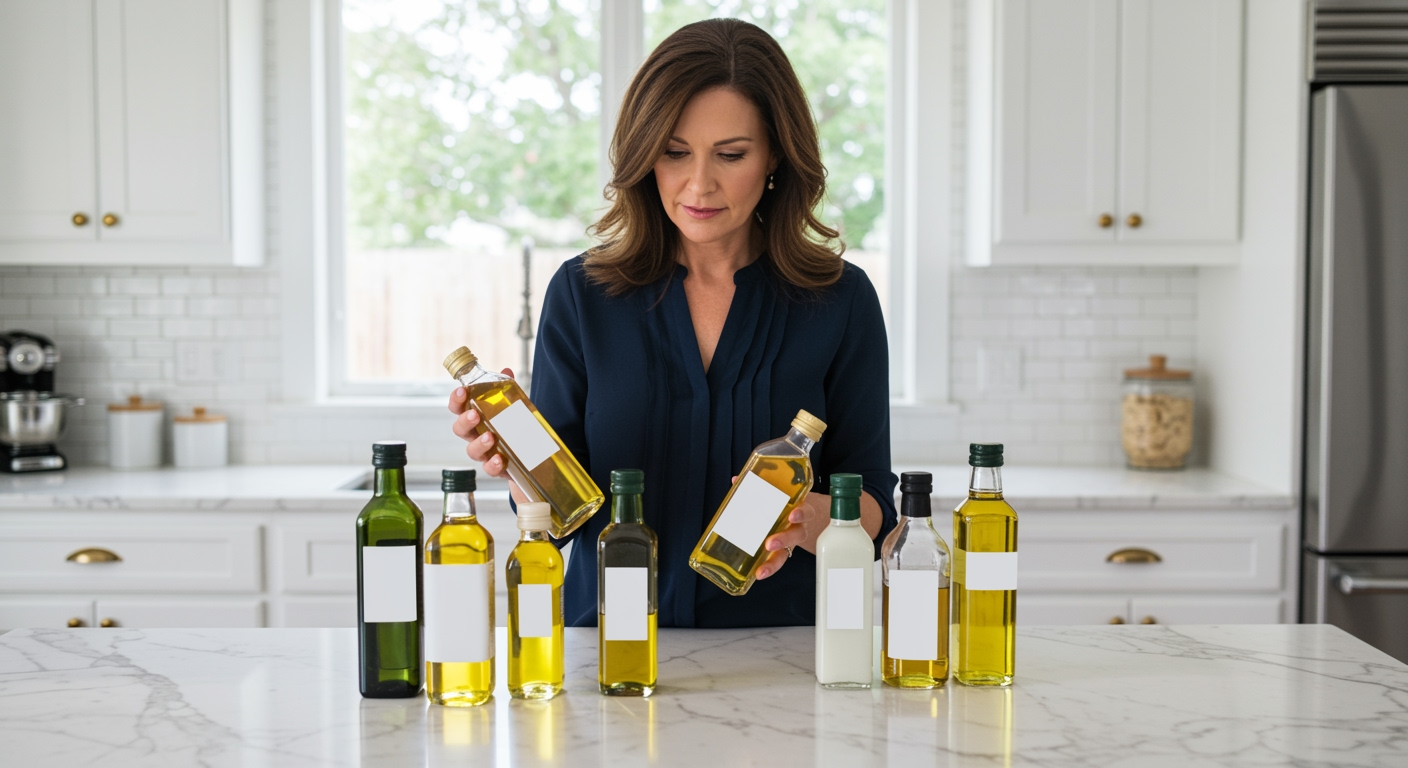✪ Key Takeaway: Certain cooking oils like olive oil can help lower blood pressure while others may increase it through inflammation.
Introduction
Your morning eggs sizzle in the pan, but the oil underneath might be doing more than just preventing them from sticking.
You probably reach for the same cooking oil every day without thinking twice about how it affects your blood pressure.
Hi, I’m Abdur, your nutrition coach and today I’m going to explain exactly how different cooking oils can either help or harm your blood pressure levels.
Which Cooking Oils Actually Lower Blood Pressure?
Extra virgin olive oil stands out as the champion for blood pressure management.
Research shows that people who consume olive oil regularly have significantly lower systolic and diastolic blood pressure readings.
The polyphenols in olive oil work like tiny soldiers fighting inflammation throughout your blood vessels.
These powerful compounds help your blood vessels relax and expand, making it easier for blood to flow through them.
Avocado oil comes in second place with its high content of monounsaturated fats and vitamin E.
Studies indicate that replacing saturated fats with monounsaturated fats can reduce blood pressure by 2-3 mmHg on average.
Flaxseed oil deserves mention too because it contains alpha-linolenic acid, an omega-3 fatty acid that supports heart health.
✪ Pro Tip: Use extra virgin olive oil for low-heat cooking and salad dressings to preserve its beneficial compounds.
Can Some Cooking Oils Actually Raise Your Blood Pressure?
The unfortunate truth is that many popular cooking oils can increase inflammation and worsen blood pressure.
Vegetable oils high in omega-6 fatty acids create an imbalance in your body when consumed excessively.
Corn oil, soybean oil, and sunflower oil fall into this category because they contain too much linoleic acid.
When you consume too many omega-6 fats compared to omega-3s, your body produces more inflammatory compounds called prostaglandins.
These inflammatory molecules cause your blood vessels to constrict and become less flexible over time.
Palm oil presents another concern because it contains high amounts of saturated fat that can contribute to arterial stiffness.
Coconut oil, despite its popularity, also contains mostly saturated fat and should be used sparingly if you have high blood pressure.
✪ Fact: The ideal omega-6 to omega-3 ratio should be 4:1, but most people consume 15:1 or higher.
What Happens When You Heat Cooking Oils Too Much?
High temperatures transform even healthy oils into harmful compounds that can damage your cardiovascular system.
When oils reach their smoke point, they begin breaking down and forming toxic substances called aldehydes.
These aldehydes increase oxidative stress in your body, which directly contributes to high blood pressure and heart disease.
Repeatedly heating the same oil makes this problem even worse because the breakdown compounds accumulate.
Your blood vessels suffer damage from these toxic compounds, leading to inflammation and reduced flexibility.
Different oils have different smoke points, so choosing the right oil for your cooking method matters tremendously.
Avocado oil has the highest smoke point at 520°F, making it perfect for high-heat cooking methods like stir-frying.
✪ Note: Never reuse cooking oil more than twice to avoid accumulating harmful breakdown products.
How Much Oil Should You Use Daily For Optimal Blood Pressure?
The amount of oil you consume matters just as much as the type of oil you choose.
Most nutrition experts recommend limiting total added fats to 2-3 tablespoons per day for optimal heart health.
This includes all cooking oils, butter, margarine, and other added fats in your meals.
Consuming too much of any oil, even healthy ones, can lead to weight gain and increased blood pressure.
Each tablespoon of oil contains about 120 calories, so portions add up quickly throughout the day.
Focus on using oils strategically rather than drowning your food in them.
A light drizzle of olive oil on your salad or a teaspoon for sautéing vegetables provides benefits without excess calories.
✪ Pro Tip: Measure your oil portions with measuring spoons instead of pouring directly from the bottle.
The Bottom Line
Cooking oils can definitely influence your blood pressure, but the type and amount you use makes all the difference.
Choose your oils like you choose your friends – quality over quantity always wins.
I would love to hear about your experiences with different cooking oils or any questions you might have about managing blood pressure through nutrition in the comments below.
References
At NutritionCrown, we use quality and credible sources to ensure our content is accurate and trustworthy. Below are the sources referenced in creating this article:





